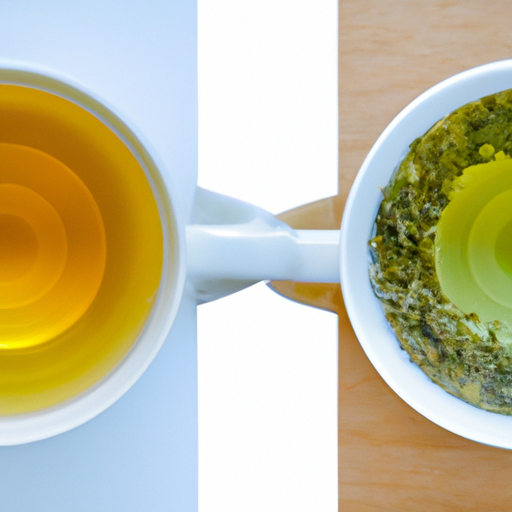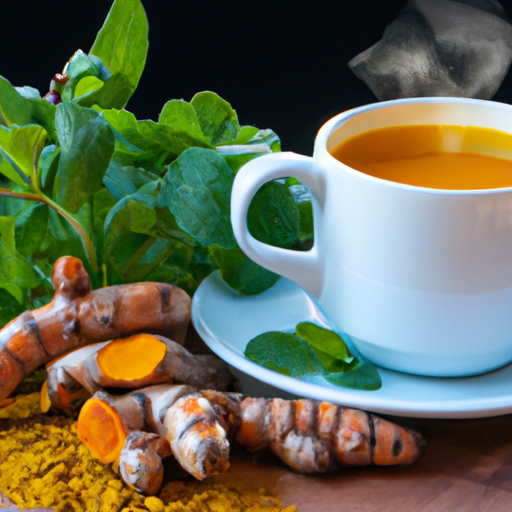In the battle against inflammation, two powerful warriors emerge from nature’s arsenal: turmeric tea and green tea. Like knights in shining armor, these beverages offer potential relief and healing for those plagued by the discomfort of inflammation.
Picture a soothing cup of tea, swirling with vibrant colors and brimming with health-giving properties. It’s as if Mother Nature herself crafted these elixirs to combat the fiery foe of inflammation. But which tea should you choose? Should you turn to the golden warmth of turmeric or the verdant goodness of green tea?
Fear not, for in this article, we will delve into the world of inflammation, uncover the superpowers of turmeric and green tea, explore their potential drawbacks, and guide you in choosing the right option for your needs.
So, grab a cup, settle in, and embark on this journey of discovery as we explore the remarkable benefits of turmeric tea and green tea in the fight against inflammation.
Key Takeaways
- Turmeric tea and green tea are powerful natural remedies for inflammation.
- Turmeric contains curcumin, which has powerful anti-inflammatory properties and enhances the body’s natural antioxidant defenses.
- Green tea contains polyphenols, which have anti-inflammatory effects and promote the growth of beneficial gut bacteria.
- Regular consumption of turmeric tea and green tea can lead to a significant decrease in inflammatory markers in the body.
Understanding Inflammation
Now, let’s dive into understanding inflammation and how it affects your body!
Inflammation is a natural response by your immune system to protect your body from injury or infection. It’s caused by various factors such as infections, injuries, or autoimmune disorders.
There are two types of inflammation: acute and chronic. Acute inflammation is a short-term response, while chronic inflammation lasts for a longer period. Chronic inflammation can have a significant impact on overall health and well-being, as it’s been linked to various diseases like heart disease, diabetes, and cancer. It can also cause symptoms such as fatigue, joint pain, and digestive issues.
Understanding the causes, role, and types of inflammation is crucial in managing and preventing chronic inflammation.
Now, let’s explore the power of turmeric in combating inflammation.
The Power of Turmeric
Curcumin, the active compound found in turmeric, has been shown to possess powerful anti-inflammatory properties. Numerous studies have demonstrated its ability to inhibit the production of inflammatory markers in the body, making it a promising natural remedy for conditions such as arthritis and inflammatory bowel disease.
Additionally, turmeric has been found to offer a range of other health benefits, including antioxidant properties, improved brain function, and potential protection against chronic diseases.
Curcumin and its anti-inflammatory properties
If you want to reduce inflammation, turmeric tea is like a soothing balm for your body. Curcumin, the active compound in turmeric, has been extensively studied for its anti-inflammatory properties. Here are four reasons why curcumin supplements and turmeric tea are considered natural remedies for inflammation:
-
Curcumin inhibits the production of inflammatory molecules in the body, helping to alleviate inflammation.
-
It blocks the activity of enzymes that contribute to inflammation, reducing its severity.
-
Curcumin also enhances the body’s natural antioxidant defenses, protecting against oxidative stress, which can trigger inflammation.
-
Studies have shown that curcumin can modulate the immune system, helping to regulate the body’s inflammatory response.
With its potent anti-inflammatory effects, curcumin is a promising option for managing inflammation. But turmeric doesn’t just stop there. It offers a multitude of other health benefits, which we will explore in the next section.
Other health benefits of turmeric
Turmeric’s incredible healing properties extend far beyond reducing inflammation, offering a myriad of other health benefits that’ll leave you feeling vibrant and rejuvenated. Studies have shown that turmeric can improve brain function and lower the risk of cognitive decline.
It’s also known to boost the immune system, thanks to its potent antioxidant effects. Turmeric has been used for centuries in traditional medicine to aid digestion and relieve gastrointestinal issues.
Additionally, this golden spice has been incorporated into popular beverages like turmeric lattes and smoothies, making it easy to enjoy its health benefits on a daily basis. So, if you’re looking for a natural way to improve your overall well-being, turmeric is definitely worth considering.
Now, let’s delve into the benefits of green tea.
The Benefits of Green Tea
I love drinking green tea because of its numerous health benefits. One of the key benefits is its high content of polyphenols, which are powerful antioxidants. They have been shown to have anti-inflammatory effects in the body. Research suggests that consuming green tea regularly may help reduce inflammation and lower the risk of chronic diseases such as heart disease and cancer.
Additionally, green tea has been found to have other health benefits. It can improve brain function, aid in weight loss, and boost the immune system.
Polyphenols and their anti-inflammatory effects
For reducing inflammation, you’ll want to focus on the powerful anti-inflammatory effects of polyphenols present in both turmeric tea and green tea. Polyphenols are plant compounds that have been extensively studied for their health benefits.
When it comes to gut health, polyphenols can help promote the growth of beneficial gut bacteria and reduce inflammation in the gut. Additionally, research has shown that polyphenols can improve cardiovascular health by reducing oxidative stress and inflammation in the blood vessels. These effects can help lower the risk of heart disease.
Moving on to the next section about the additional health benefits of green tea, it’s important to note that green tea contains other bioactive compounds that contribute to its overall health-promoting properties.
Additional health benefits of green tea
To unlock even more health benefits, let the vibrant green elixir of wellness transport you to a world of improved metabolism, enhanced brain function, and a strengthened immune system.
Green tea has been shown to aid in weight loss by boosting metabolism and increasing fat oxidation. It contains catechins, powerful antioxidants that can promote cardiovascular health by reducing cholesterol levels and improving blood vessel function.
Studies have also suggested that green tea consumption may lower the risk of heart disease and stroke. Additionally, green tea’s high content of polyphenols may help protect against various types of cancer.
However, it’s important to note that while green tea offers numerous health benefits, there are also potential drawbacks to consider.
Potential Drawbacks
Consider the potential drawbacks of turmeric tea or green tea for inflammation; you may be surprised to discover some unexpected side effects. While both turmeric tea and green tea offer numerous health benefits, it is important to be aware of their potential risks and side effects.
| Turmeric Tea | Green Tea | |
|---|---|---|
| Upset Stomach | Yes | No |
| Allergies | Possible | Rare |
| Interference | Blood thinners | Iron absorption |
| Pregnancy | Not advised | Limit intake |
Turmeric tea can cause an upset stomach in some individuals, while green tea is generally well-tolerated. Turmeric allergies are possible, although rare, whereas green tea allergies are very uncommon. It is also important to note that turmeric tea may interfere with blood thinners, while green tea can hinder iron absorption. Pregnant women should avoid turmeric tea, while green tea should be consumed in moderation.
Considering these potential drawbacks, it is essential to choose the right option for managing inflammation.
Choosing the Right Option
While both turmeric tea and green tea have potential drawbacks, it’s important to consider the specific benefits they offer when choosing the right option for inflammation. Turmeric contains a compound called curcumin, which has strong anti-inflammatory properties. It’s been shown to reduce inflammation markers in the body and alleviate symptoms of conditions like arthritis and inflammatory bowel disease.
On the other hand, green tea is rich in antioxidants called catechins, which also have anti-inflammatory effects. These antioxidants help neutralize free radicals and reduce oxidative stress in the body.
Therefore, when deciding between turmeric tea and green tea, it’s crucial to consider the role of antioxidants in combating inflammation. By incorporating turmeric tea into your routine, you can harness the power of curcumin and its anti-inflammatory benefits.
Incorporating Turmeric Tea into Your Routine
When incorporating turmeric tea into your routine, you’ll be amazed to know that a study found that regular consumption of this powerful beverage can lead to a significant decrease in inflammatory markers in your body.
To incorporate turmeric tea into your daily regimen, there are various recipes available online that you can try. You can add a teaspoon of turmeric powder to a cup of boiling water and let it steep for about 10 minutes. You can also experiment with adding other ingredients like ginger, lemon, or honey to enhance the flavor.
Another option is to consider turmeric supplements, which can provide a concentrated dose of the active compound curcumin.
As we explore the benefits of incorporating green tea into your routine, you’ll discover how it complements the effects of turmeric tea in reducing inflammation.
Incorporating Green Tea into Your Routine
When it comes to incorporating green tea into my routine, I’ve found that the brewing technique plays a crucial role in obtaining maximum benefits. I’ve learned that steeping the tea for about 2-3 minutes in water that’s about 160-180°F yields the best results.
Additionally, I’ve found that consuming 2-3 cups of green tea per day is the recommended dosage for reaping its anti-inflammatory benefits.
Brewing techniques for maximum benefits
To get the most out of your turmeric or green tea, it’s essential to brew it correctly. When it comes to brewing time, the optimal duration for both turmeric and green tea is around 3-5 minutes. This allows the flavors and beneficial compounds to infuse into the water without becoming too bitter.
For the best turmeric tea recipe, start by boiling water and adding a teaspoon of ground turmeric. Let it simmer for 10 minutes to release the active compounds. Then, strain the mixture and add honey or lemon to taste. This recipe ensures that you’re getting the maximum benefits from the turmeric.
Moving on to recommended dosage and frequency, it’s important to consult with a healthcare professional to determine the right amount for you.
Recommended dosage and frequency
It’s crucial to consult with a healthcare professional to determine the right amount and frequency of consumption for maximum benefits. The recommended dosage of turmeric tea or green tea for inflammation varies depending on individual factors such as age, weight, and overall health. However, a general guideline is to consume 1-2 cups of turmeric tea or green tea per day. It’s important not to exceed this dosage as excessive consumption may lead to potential side effects such as digestive issues or liver problems. Additionally, it’s worth noting that the benefits of turmeric tea or green tea for inflammation are not immediate, and consistent consumption over time is key. To help you understand the dosage better, here is a 2-column, 3-row table summarizing the recommended dosage and potential side effects:
| Tea Type | Recommended Dosage | Potential Side Effects |
|---|---|---|
| Turmeric Tea | 1-2 cups per day | Digestive issues, liver problems |
| Green Tea | 1-2 cups per day | Digestive issues, caffeine sensitivity |
Remember, it’s always best to consult with a healthcare professional to determine the appropriate dosage for your specific needs and any potential risks.
Frequently Asked Questions
Can turmeric tea or green tea completely cure inflammation?
Turmeric tea and green tea have numerous health benefits, including anti-inflammatory properties. While they can help reduce inflammation, it is important to note that they may not completely cure it.
Are there any side effects of consuming turmeric tea or green tea for inflammation?
When it comes to potential side effects of consuming turmeric tea or green tea for inflammation, it’s important to consider individual sensitivities and potential interactions with medications. Consulting a healthcare professional is always recommended.
How long does it take for turmeric tea or green tea to start reducing inflammation?
Turmeric tea and green tea offer numerous benefits for overall health. Both have unique taste profiles, with turmeric tea having a warm and earthy flavor, while green tea is more grassy. The time it takes for them to reduce inflammation varies and can be influenced by factors such as dosage and individual response.
Can I drink both turmeric tea and green tea together to maximize the anti-inflammatory effects?
Drinking both turmeric tea and green tea together can maximize the anti-inflammatory effects. Not only do they provide numerous health benefits, but they also have distinct taste profiles, with turmeric tea being warm and earthy, while green tea has a refreshing and grassy flavor.
Are there any specific brands or types of turmeric tea or green tea that are more effective for reducing inflammation?
When it comes to reducing inflammation, I’ve found that certain brands of turmeric tea and green tea stand out. Some of the best turmeric tea brands and the benefits of green tea for inflammation are worth exploring.
Conclusion
In conclusion, both turmeric tea and green tea have shown potential benefits in reducing inflammation. Turmeric contains a compound called curcumin, which has anti-inflammatory properties supported by scientific research.
Green tea, on the other hand, is rich in antioxidants that may help reduce inflammation in the body.
When choosing between the two, it ultimately comes down to personal preference and taste. So why not try both and see which one works best for you? After all, who doesn’t want a delicious and healthy beverage that can potentially reduce inflammation?










